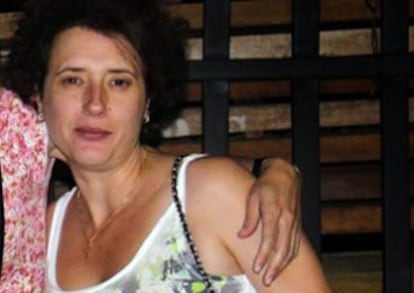Madrid health chief accuses Ebola victim of lying to doctors
Francisco José Rodríguez denies any failures regarding training of medical teams

The Madrid regional health chief, Francisco José Rodríguez, has accused the Spanish nursing assistant who contracted Ebola of hiding the fact that she had treated a missionary with the virus. Teresa Romero, he claimed, had not told her doctor nor the rest of the medical staff that she saw of her role in the care of Spanish priest Manuel García Viejo, who was repatriated from West Africa and treated in Madrid’s Carlos III hospital until his death on September 25.
“Today she admitted her error when she removed her suit,” Rodríguez said in the Madrid regional assembly on Wednesday, in reference to a telephone conversation the nursing assistant held with EL PAÍS from her hospital bed, where she is being kept in isolation. In that conversation, Romero stated that she may have made an error when removing her protective clothing after dealing with García Viejo. “All this time she has been systematically denying it,” Rodríguez continued, “just as she hid the fact that she had dealt with an Ebola patient.
Rodríguez also revealed that two hairdressers are being monitored for Ebola symptoms, after Romero went to their place of business after seeing her doctor for a hair-waxing session.
She hid the fact from her doctor that she had been in direct contact with an Ebola patient”
The Madrid health chief gave more information about the chain of events relating to Romero’s infection with Ebola, which was not confirmed until Monday. “She had been running a fever of 38.6ºC since September 29,” Rodríguez explained. On October 2, she called the Carlos III hospital regarding her condition, but had, he claimed, already seen her local doctor, “from whom she hid the fact that she had been in direct contact with an Ebola patient,” he said.
“On October 3, [Romero] returned a call from the Madrid Health Service,” Rodríguez said. “She reported having a temperature of 36.7ºC. She also reported being lethargic and lumbago. She was advised to take her temperature twice a day, and if the result was above 38.6ºC that she should get in touch with the health authorities. At no time did she have a fever above 38.6ºC and the case was considered low risk,” he continued. “This is my understanding, but I am not ruling out the fact that she may have been lying to us.”
At 4am on Monday morning, Romero called the health services saying that she was running a temperature of 37.2ºC, Rodríguez explained. A regular ambulance was sent to collect her, and once at the Alcorcón hospital she was classed as a low-risk patient. Only after new tests, on Monday afternoon, was she confirmed as having contracted the Ebola virus.
This is my understanding, but I am not ruling out that she may have been lying”
Romero is reported to have entered Manuel García Viejo’s room twice during his treatment, but at no time did she have direct contact with the bodily fluids of the missionary. On September 25 she changed his diapers and sheets, during which the patient was immobilized. The next day she cleaned up and disposed of his vomit.
Rodríguez also rejected claims that the medical teams charged with taking care of the missionaries, who were repatriated from Liberia and Sierra Leone, were not sufficiently trained. In the first case, he explained, that of Miguel Pajares, 25 nurses – 15 of whom were volunteers – attended to the patient. There were also 18 voluntary nursing assistants – one of whom was Romero – who took care of the two men.
“When they are volunteers, they have a high level of training,” the Madrid health chief stated. “No one forced them to do it.” In response to criticism from other parties in the assembly, he said that all of the staff were “considered low risk, because they entered the rooms using the adequate equipment. None of them had contact with fluids, and they all said that they had acted correctly.”
Rodríguez went as far as to describe as “harassment” the criticism he has received since news of the case broke on Monday.
Tu suscripción se está usando en otro dispositivo
¿Quieres añadir otro usuario a tu suscripción?
Si continúas leyendo en este dispositivo, no se podrá leer en el otro.
FlechaTu suscripción se está usando en otro dispositivo y solo puedes acceder a EL PAÍS desde un dispositivo a la vez.
Si quieres compartir tu cuenta, cambia tu suscripción a la modalidad Premium, así podrás añadir otro usuario. Cada uno accederá con su propia cuenta de email, lo que os permitirá personalizar vuestra experiencia en EL PAÍS.
¿Tienes una suscripción de empresa? Accede aquí para contratar más cuentas.
En el caso de no saber quién está usando tu cuenta, te recomendamos cambiar tu contraseña aquí.
Si decides continuar compartiendo tu cuenta, este mensaje se mostrará en tu dispositivo y en el de la otra persona que está usando tu cuenta de forma indefinida, afectando a tu experiencia de lectura. Puedes consultar aquí los términos y condiciones de la suscripción digital.









































